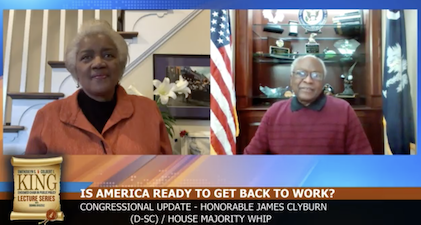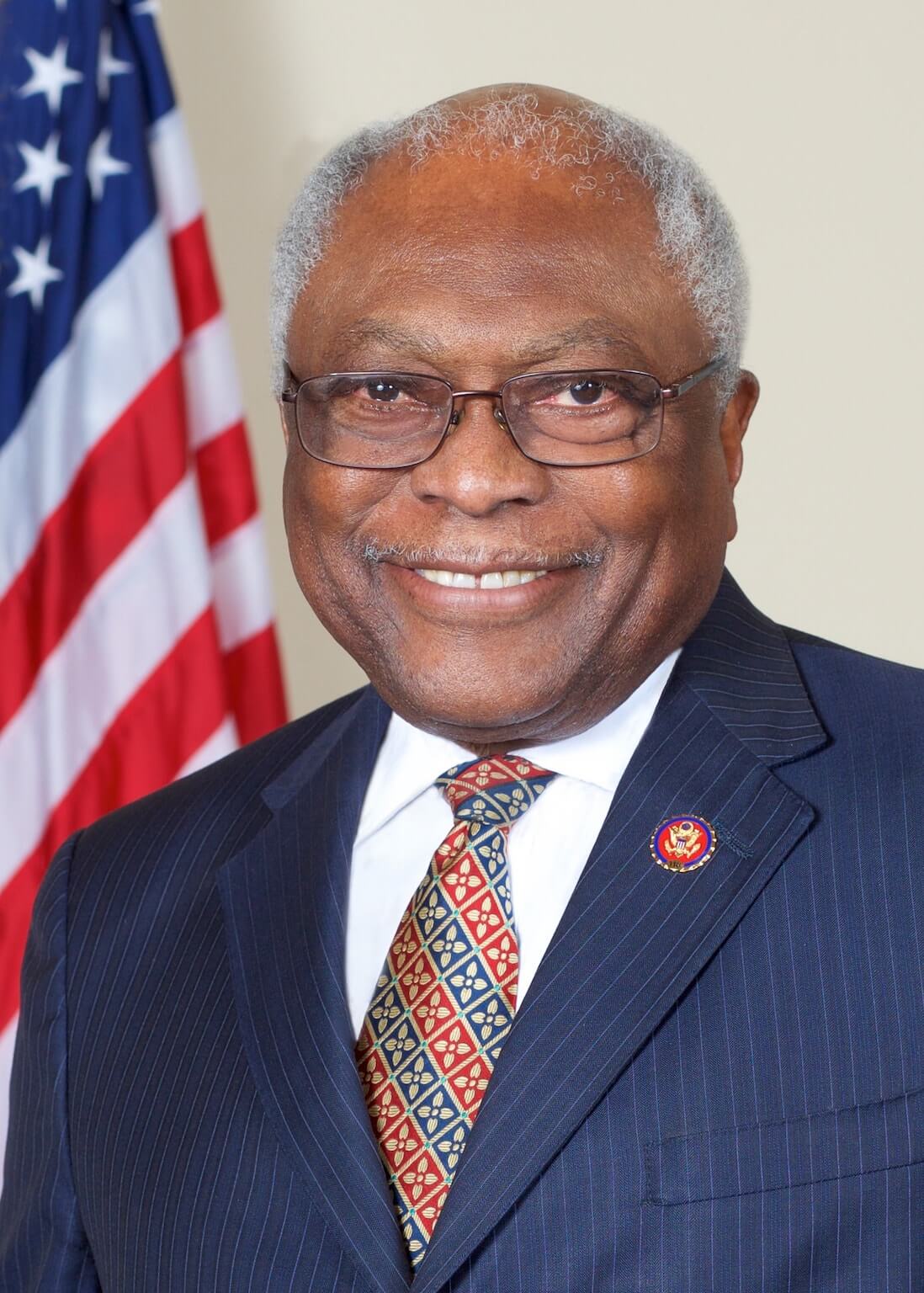
WASHINGTON – Amid the COVID-19 pandemic, on Thursday, April 16, U.S. Representative and House Majority Whip James E. Clyburnjoined the 2019-2020 Gwendolyn S. and Colbert I. King Endowed Chair in Public Policy Lecture Series for Is America Ready to Get Back to Work?, a virtual conversation moderated by King Endowed Chair in Public Policy Donna Brazile. Majority Whip Clyburn is the third-ranking Democrat in the United States House of Representatives, having served South Carolina’s 6th congressional district since 1993 and being recently appointed Chair of the House Select Committee on Coronavirus.
Much of the conversation with Brazile focused on the country’s response to COVID-19 and whether now is the time to begin reopening schools and businesses, which have been closed for weeks under recommendations by the World Health Organization and the Centers for Disease Control and Prevention.
“I do believe that Americans are ready to go back to work,” Clyburn explained. “However, I do not believe that America is prepared for Americans to come back to work.”
 Rep. Clyburn says before attempting to establish a new normal, there are certain necessary steps that must be taken to create a safer environment. He says there must be widespread coronavirus testing that includes mobile testing units for residents of rural and hard-to-reach communities who are currently unable to get to testing sites. He describes underserved communities as not only situated in remote areas of the country but also within some of the nation’s largest urban areas as mostly minority areas with inadequate access to common resources. Unfortunately, families living within those communities are now the concern of the new and alarming trend regarding African Americans contracting and succumbing to COVID-19 at higher rates than other race groups.
Rep. Clyburn says before attempting to establish a new normal, there are certain necessary steps that must be taken to create a safer environment. He says there must be widespread coronavirus testing that includes mobile testing units for residents of rural and hard-to-reach communities who are currently unable to get to testing sites. He describes underserved communities as not only situated in remote areas of the country but also within some of the nation’s largest urban areas as mostly minority areas with inadequate access to common resources. Unfortunately, families living within those communities are now the concern of the new and alarming trend regarding African Americans contracting and succumbing to COVID-19 at higher rates than other race groups.
“Another issue I know you are deeply concerned about is the racial disparities that is taking place currently. In the state of South Carolina Black Americans make up 41 percent of coronavirus cases but account for more than half of the deaths there,” Brazile mentioned. “How can we restructure our healthcare system to ensure Black Americans and African Americans are not the victim of this pandemic?”
“I believe this inequity has to be handled,” Clyburn responded. “When we were debating this issue, many of us knew about these inequities. I’ve been crying out about this ever since I’ve been in Congress. And, since then, I’ve been pushing 10-20-30 formula.”
That formula is laid out in the American Reinvestment and Recovery Act, which was established to increase access to quality schools, affordable quality health care and adequate job opportunities in impoverished communities. According to the Congressman’s website, a provision of the stimulus package directed at least 10 percent of Rural Development investments be made in persistent poverty communities, defined as counties where 20 percent or more of the population once lived below the poverty line for the last 30 years.
“We know that the lack of healthcare is very prevalent throughout these communities. We know that adequate education is being denied,” he says. “We must restructure things more into our vision to make the greatness of this country accessible and affordable for all.”
With health and public safety concerns regarding the upcoming presidential election, Rep. Clyburn, who votes absentee or early each year due to work, is collaborating with his House colleagues to secure funding to ensure efficient and effective federal elections in November. He insists that lawmakers have the responsibility to protect the public through proactive measures like voting by mail and no-fault early voting, especially for Americans over the age of 65 who are at a higher risk of developing severe complications from COVID-19.
“We did not stop voting for the Civil War and we will not stop voting for this pandemic war,” Rep. Clyburn says.
Among the other topics discussed, Brazile and Clyburn touched on government support of small businesses, issues with economic impact payments and the importance of the 2020 Census in determining what people’s needs are and where people are situated across the country.
Since 2008, the Gwendolyn S. and Colbert I. King Endowed Chair in Public Policy Lecture Series has provided students access to experienced, senior public service executives who have developed and advanced public policy initiatives. For more information, contact kinglectureseries@howard.edu.
###
About Howard University
Founded in 1867, Howard University is a private, research university that is comprised of 13 schools and colleges. Students pursue studies in more than 120 areas leading to undergraduate, graduate and professional degrees. The University operates with a commitment to Excellence in Truth and Service and has produced one Schwarzman Scholar, three Marshall Scholars, four Rhodes Scholars, 11 Truman Scholars, 25 Pickering Fellows and more than 70 Fulbright Scholars. Howard also produces more on-campus African-American Ph.D. recipients than any other university in the United States. For more information on Howard University, visit www.howard.edu.
Media contact: Ramzey Smith, Office of University Communications, ramzey.smith@howard.edu




